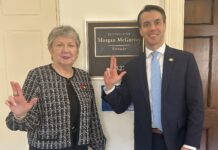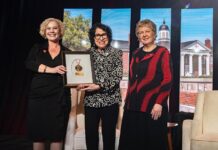
Kentucky’s two research universities, the University of Louisville and University of Kentucky, along with six other Kentucky institutions, have been awarded a five-year, $24 million grant to support the fundamental science needed to advance next generation manufacturing technologies, flexible electronics and robotics. The Kentucky National Science Foundation’s (NSF) EPSCoR, or Established Program to Stimulate Competitive Research, awarded the grant.
“This cooperative project will help bolster Kentucky’s economy, create jobs and put the Commonwealth at the forefront of automation and human-machine interaction,” said UofL president Neeli Bendapudi and UK president Eli Capilouto, in a joint statement.
The project, titled the Kentucky Advanced Partnership for Enhanced Robotics and Structures (or KAMPERS), will harness the collective research power of 40 multidisciplinary researchers from UofL, UK, Eastern Kentucky University, Kentucky State University, Morehead State University, Somerset Community College, Transylvania University and Western Kentucky University.
A video explaining the KAMPERS project can be found here.
The research results will have applications in the construction of components for robotic and autonomous systems in areas as diverse as elder care, home service, health care, education and other collaborative human-robot interactions.
The research for the KAMPERS project will fall into three categories: materials, device configuration and systems. Co-investigators of research include UK professors Seth DeBolt and John Anthony, and UofL electrical and computer engineering professor Dan Popa. Popa and his team are working in all three research areas, with a special emphasis on collaborative robotics.
“As we introduce more robots in the manufacturing environment, they have to be more intelligent and they have to be chaperoned and taught by the workers —in a way that doesn’t take jobs but creates more opportunities,” Popa said. “I think the frontier is to push into more and more applications for medium to small companies that can use this technology. This will do a lot for robotics in Kentucky and give us a nationally visible research presence.”
UofL’s portion of the grant is $5.3 million. Fifteen UofL faculty and 15 to 20 students and staff will work on the project, according to Popa. He says the collaboration could also pave the way for a new robotics institute at UofL.
KAMPERS will hire, educate and mentor eight new faculty, and an average of five post docs and 28 graduate students per year. It will offer opportunities for undergraduate researchers, creating a ripple effect of experience throughout the state and country.
The grant also aims to increase underrepresented minorities in these fields, including African Americans, Hispanics and women.

































